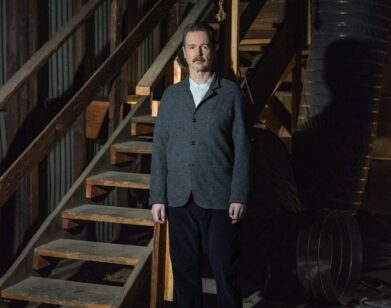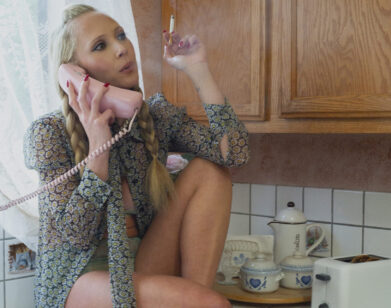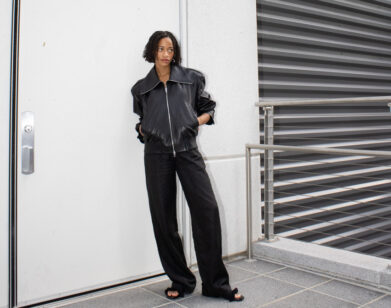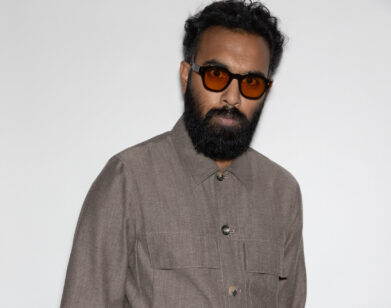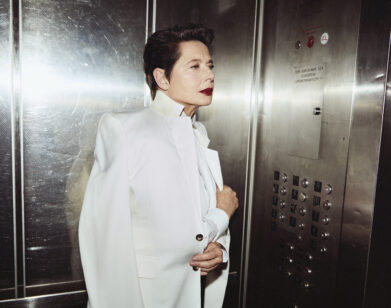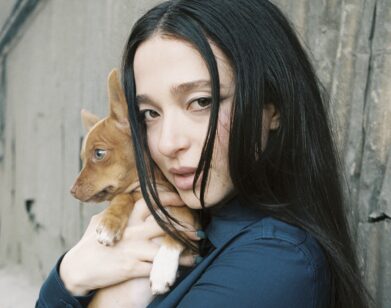Mary Elizabeth Winstead, Honestly
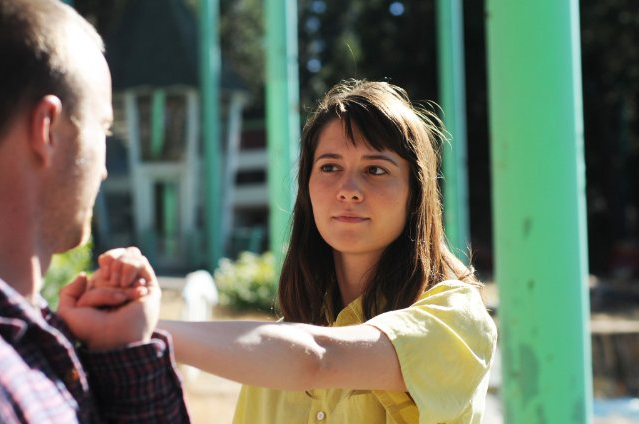
ABOVE: MARY ELIZABETH WINSTEAD IN SMASHED. IMAGE COURTESY OF OANA MARIAN/SONY PICTURES CLASSICS
Ramona Flowers’ face, haloed by a shoulder-length mane of blue hair, is an iconic image for anyone who has seen 2010’s Scott Pilgrim vs. the World. But Mary Elizabeth Winstead, the actress responsible for bringing Ramona to life, is a bit more of a chameleon. Over the past decade, Winstead has flitted from film to film, often serving as the best part of a decent but otherwise forgettable movie.
All this is poised to change, however, as Winstead takes center screen this weekend in Smashed. Directed by James Ponsoldt and co-written by Ponsoldt and Susan Burke, Smashed centers on a young married couple (Winstead and Aaron Paul) whose booze-addled relationship is tested when the wife decides to get sober. Winstead’s performance as Kate Hannah is a tour de force, sure to grant her public recognition as a talent to be reckoned with—recognition that has been a long time coming. Winstead spoke to us recently about Smashed, the enduring fantasy of the “dream girl,” and the excitement of discovering new voices in filmmaking.
KEELY WEISS: How has the journey of this film been for you? The hype has been building steadily ever since Sundance.
MARY ELIZABETH WINSTEAD: I mean, even getting into Sundance, I was screaming and jumping around the room because to me that really was just the pinnacle of everything we were trying to do. We just hoped people would see the movie in some capacity, that it would find some audience and maybe at least a small distribution company would pick it up or something, and every step of the way it’s just been growing to bigger and bigger proportions than I expected. You end up doing more press for a little film like this than you do for the really big ones, which is not quite what I expected, but I’m happy to do press for a little movie that you’re really trying to get people to see. I’m not one of those actors that hates press and gets really groan-y about it—I always like talking about films—but it’s just been a really refreshing experience to get to promote this film because it’s very easy to talk about.
WEISS: This film is pretty much entirely focused on your performance, and I imagine that must have been a lot of pressure, but it also must have been very liberating.
WINSTEAD: Yes, yes, both. When I got the part I had the realization that, you know, I’ve really never done anything like this before and I’ve got a lot to prove to others and myself, so it was a little bit scary. It was a huge challenge. But everything about it was so liberating, just playing a part where there’s no makeup and I didn’t have to be pretty at any moment—or anything other than whatever was most truthful for the character.
WEISS: Yeah, it’s a very honest film.
WINSTEAD: Yeah. [laughs] All the characters are very authentic, and I think James and Susan just didn’t look down on any of them or create any of them to be villains in any way—they’re all just human beings who are trying to be good people and are trying to figure out how to live their lives in the most honest way.
WEISS: That’s actually a major theme for your character, because as Kate sobers up she becomes very focused on living her life honestly, to the point where that honesty ends up screwing her over.
WINSTEAD: For me, that line—”You just have to learn to live your life honestly”—was kind of the crux of the whole thing. I have no dependency on any substance, so I had to figure out what it was about my life that I was being dishonest about, and I didn’t know what it was, but I knew that I wasn’t wholly living my life honestly. Once I figured out what my own issues were, it became easy to click into who she was and make my issues the same as her issues. I don’t feel like this film is necessarily about alcoholism; it’s much more about relationships and growing up and accepting yourself. I think alcoholism was sort of a symptom of all of that, and talking to alcoholics was great in large part just because I wanted to respect what they go through and make sure that I appropriately portrayed that. But what I was going through in playing the character didn’t really have anything to do with alcohol.
WEISS: How do you see Kate as a character?
WINSTEAD: I love Kate. She’s a good person who makes mistakes, who picks herself up again and continues to try to be a good person and continues to make mistakes [laughs] and continues to pick herself up again. I think those are the kinds of people that we all root for and that we all love because nobody’s perfect. Anytime I’m given scripts where I’m sort of the fantasy girl, it’s hard for me because that’s not real and I don’t think it’s a great thing to put out there consistently.
WEISS: This idea of female perfection and the perfect female character is something that pops up a lot, and you’ve played characters liked that before. I wouldn’t quite call Ramona Flowers an example of that character, because the movie calls Scott out on treating her like that.
WINSTEAD: And she isn’t perfect, and that’s kind of the whole thing: he puts her in this “dream girl” box that she doesn’t want to be in. But she is viewed that way by a lot of people, and it’s a misconception about the character, I think, because I purposefully played her as very imperfect. [laughs]
WEISS: That’s definitely something you see often, the idea that an audience’s preconceptions about a character will override what the creators are trying to tell them. Obviously it happened with Ramona, as well as on Breaking Bad with Skyler, who was originally presented as this cold shrew of a wife and is now supposed to be more of a hero—but you still see tons of people missing the point and idolizing Walt.
WINSTEAD: Right, yeah, I know. I’m not… [whispers] quite caught up on Breaking Bad yet. I’m a little behind. But totally! Every film I’ve done has been that way. We make conscious choices to do something a certain way and then people think it’s accidental and they’re like, “Oh my god, why in the world would they do that?” And I’m always like, “That’s an integral part of what we’re trying to say…”
WEISS: Smashed is also based in large part on Susan’s own experiences with sobriety. How did your relationship with her affect your performance?
WINSTEAD: I think the thing is that I’m such a big fan of hers and admire her so much, and she’s so smart and funny and fun to be around, and I imagine she was also that way when she was drinking.
WEISS: Like Kate, she could crap her pants and still be cute. [laughs]
WINSTEAD: She is that girl! That’s the way I imagined her when she was her sort of alcoholic self. To me it just made it make total sense that she could be an alcoholic and be totally out of control but still be the girl next door, the girl that everybody wants to hang out with, the girl that the little kids can look up to.
WEISS: You’ve gotten to a place in your career where you have the luxury of being able to have your choices be about who you want to work with instead of having it be about just getting the next job or even just getting a job that doesn’t suck.
WINSTEAD: I mean, I think I’m getting there. I still don’t know that I’m quite there yet. I hope I am; you never know until you see how long it takes for you to get the kind of part that you want to find. But, yeah, I feel that I’m lucky and I’m more and more in that sort of vein that I’ve always wanted to be in.
WEISS: How do you feel about the idea of having the potential to “discover” filmmakers who have a vision or a voice or even just a way of working that inspires you?
WINSTEAD: It’s really exciting, especially the place I am now. I’m still not at the level of having the kind of name cachet of being able to say “I want to work with this person, I want to do that film,” but what I do feel like I might be starting to have is the ability to pick out a director who’s really new, who maybe hasn’t hit the radar of the really big stars yet, who might be interested in working with somebody like me. That would be a really special thing, to work with somebody who’s young and has a new interesting voice, because I feel like a lot of the more established directors right now are just casting the sort of most popular person of the moment. I want to work with interesting people, and the way that I want to go about it is starting off and sort of having my career and their careers grow together, which is what I hope I’m going to accomplish with James. And I’d love to find other directors that I can have that same kind of relationship with.
WEISS: What inspires you in terms of finding those new voices?
WINSTEAD: I love anybody who’s willing to stick to their own vision, their own voice, who’s not easily swayed by money or by financers who are going to tell them what they should do. I think there’ve been a lot of filmmakers coming up now who are doing a lot with very little money and really creating their own voices, and it’s exciting. I really want to work with people like that.
SMASHED IS OUT IN LIMITED RELEASE THIS FRIDAY, OCTOBER 12.

